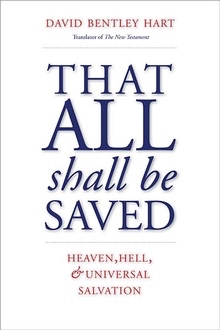
NILS VON KALM reads David Bentley Hart’s That All Shall Be Saved…
David Bentley Hart,
That All Shall Be Saved: Heaven, Hell, and Universal Salvation
Yale University Press, US, 2019
ISBN-13: 978-0300246223
David Bentley Hart has a reputation for having a giant intellect. His latest book, That All Shall Be Saved, simply adds to that reputation.
This work details Hart’s long held view of universal salvation, that everyone, even the most brutal people you can think of, such as Hitler, Pol Pot and Stalin, will all ultimately experience the salvation that we would automatically expect for people like Mother Theresa or Billy Graham.

“Readers of an evangelical persuasion may be disappointed that Hart’s main form of argument seems to be rational logic over exegesis of Bible passages which seem to clearly make the case for eternal conscious torment…What Hart does do however, is base his arguments on the ultimate Biblical notion that, above anything else, God is love and is fully revealed in the life of Jesus.”
On first thought, such a concept will be unspeakably unjust and plain unBiblical for many – maybe even the majority – of readers. If, like me, you have an evangelical background, the only real Biblical destiny for those without Christ is an eternal conscious torment of fire. If you believe anything else, you are either not a real Christian or are on the dangerous road to apostasy.
One fact that Hart deals with in this monumental work though is that, in the first centuries of the church, the belief in eternal conscious torment, also known as ECT, was not the only, and not even the majority belief. The idea of universal salvation was common, as was the other main idea of annihilation.
Neither ECT nor annihilation are satisfactory though for Hart. Using brutal logic, he takes you through arguments based on the Scriptural evidence that God is the source of all love, to show that such a God could never, and would never create humanity only to have the vast majority of us be subjected to a never-ending conscious torment nor annihilated to the point of non-existence.
All the usual arguments for ECT and, to a lesser extent, annihilationism, are tackled head-on with Hart’s usual abruptness.
Readers of an evangelical persuasion may be disappointed that Hart’s main form of argument seems to be rational logic over exegesis of Bible passages which seem to clearly make the case for ECT. For instance, passages like Matthew 25:31-46, the famous story of the ‘Sheep and the Goats’, where we are told that the fate of the ‘Goats’ is eternal punishment, is given just a glancing overview.
What Hart does do however, is base his arguments on the ultimate Biblical notion that, above anything else, God is love and is fully revealed in the life of Jesus. He also explains that, nowhere in the Old Testament is the idea of ECT put forward, but that it first gained prominence in the era between the Old and New Testaments. Such a history lesson will prove helpful indeed for many readers.
Hart divides this book into three parts, which include four meditations. The parts and meditations deal with the question of an eternal hell, the question of who God is, what judgment is, what a person made in the image of God is, and the question of freedom in terms of the rational will.
This last section, on freedom, is perhaps the most profound. A strong argument for ECT revolves around the idea that, because God has created us with free will, that includes the freedom to reject God and therefore choose to spend eternity in God’s absence.
What Hart explains, though, is that true freedom is not the ability to choose whatever we want, but the ability to choose good over evil. This is certainly my experience. The more I am surrendered to God, the more Christlike I become, and the more freedom I experience. That is why Jesus talked about slavery to sin and that if the Son would set you free, you will be free indeed. Freedom in Christ is the freedom we all ultimately long for. Freedom to do whatever we like is not true freedom. It is not what being truly human is about.
At various stages throughout the book, Hart does admit that there are some verses that can be taken to be interpreted as putting forward the concept of ECT or annihilationism. But in the end he forcefully grants these positions unworthy of respect and nonsensical if we are to believe in the ultimate goodness and love of God.
One of the main points to take away from this book is that it does not necessarily presuppose a definition of salvation that has one group of people enjoying eternity up in heaven with Jesus while everyone else suffers in agony down in a fiery hell. The majority of New Testament scholars see salvation as much bigger than that, encompassing the renewal of the entire creation. I strongly suspect Hart would be in that group.
In the end, whether or not you agree with Hart, he certainly puts forward a strongly rational and convincing case for the universal salvation of all humanity. I would have liked more detailed exegesis of the Biblical text. That is not to say at all that it is not there; it is. But maybe not enough for readers of a more evangelical persuasion.





